Search the Special Collections and Archives Portal
Search Results

Transcript of interview with Carol Forsythe by Sam Copeland, March 2, 1977
Date
1977-03-02
Archival Collection
Description
On March 2, 1977, Sam Copeland interviewed Carol Forsythe about her experience living in Las Vegas, Nevada. Carol first describes the details with which she was familiar about her husband’s career as a firefighter, specifically facts about the growth of the Clark County Fire Department. Forsythe later talks about the development of the town when she first arrived in Las Vegas, and she later describes the different residences at which she and her family lived. She also describes the different changes in building and development over time in Las Vegas, and she mentions the early use of swamp coolers before air conditioning. The narration concludes with Forsythe’s description of the Helldorado tradition and its changes as well as her family’s Episcopalian faith and the churches they attended.
Text

Transcript of interview with Norman Forsythe by Bill Cunningham, March 4, 1978
Date
1978-03-04
Archival Collection
Description
On March 4, 1978, Bill Cunningham interviewed Norman Forsythe (born 1927 in St. Paris, Ohio) about his experience as a firefighter in Las Vegas, Nevada. Forsythe discusses his original move to Las Vegas and his eventual joining of both the city of Las Vegas and Clark County Fire Departments. He also goes into detail about fighting the fire at the El Rancho Vegas in 1960. Forsythe also talks about the responsibilities as his then-current rank of battalion chief. The two also discuss housing in Las Vegas, the living conditions of the city, and Forsythe’s family. The interview concludes with Forsythe talking briefly about his family’s recreational activities and his experience as a baseball coach.
Text

Transcript of interview with Norman Forsythe by Steve Flint, March 19, 1981
Date
1981-03-19
Archival Collection
Description
On March 19, 1981, Steve Flint interviewed Norman Forsythe (born 1927 in St. Paris, Ohio) about his experiences living in Las Vegas, Nevada. Forsythe talks mainly about his arrival to Las Vegas and his time as a firefighter with, at first, the Las Vegas Fire Department and thereafter the Clark County Fire Department, where he eventually became a battalion chief. Forsythe also talks about the history and development of Las Vegas, the prices of land, some notable fires, including the El Rancho Vegas fire, and what he recalls about the aboveground atomic testing.
Text

Transcript of interview with Robert Foster by Kelley Tuchman, March 2, 1978
Date
1978-03-02
Archival Collection
Description
On March 2, 1978, Kelley Tuchman interviewed Dr. Robert Foster (born 1921 in Colorado Springs, Colorado), principal of Helen J. Stewart School, about his experiences in educating and helping the mentally disabled. Foster first talks about his background in the military and his eventual teaching experience in special education at the University of Nevada, Las Vegas. Foster then discusses his motivations for getting into the special education field and later talks about the growth of the program in Clark County and throughout the country. He also describes the role of legislation in helping the mentally disabled and later goes into detail about the approaches of the training and education program itself. Toward the end of the interview, Foster mentions a few of his personal experiences and discusses the importance of volunteering to help the mentally and physically disabled.
Text
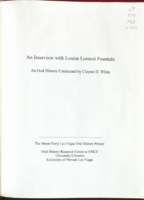
Transcript of interview with Louise Lorenzi Fountain by Claytee D. White, March 30, 2004
Date
2004-03-30
Archival Collection
Description
Louise Lorenzi Fountain was born on Nov. 14, 1913, to David Lorenzi, a French immigrant, and Julia Travese Moore from La Belle, Missouri. Her younger years were devoted to helping her father develop and manage Lorenzi Lake Park, which was built by Lorenzi and is considered a primary landmark in the development and life of the citizens of Las Vegas. Louise Lorenzi's father has been noted as one of the 100 most influential citizens of Las Vegas by the Las Vegas Review Journal. He opened the park in 1926 with a pair of man-made lakes and a swimming pool, dance hall, band shell and other amenities. In the interview, Louise talks about her father and mother and describes Las Vegas during its early years. Louise Lorenzi married Edgar Fountain in 1936. He had hitchhiked from Georgia in search of work on the construction of Boulder Dam, now Hoover Dam. The couple left Las Vegas for 10 years and lived in Grand Coulee, Washington, where he helped build Grand Coulee Dam. After returning to Las Vegas, Louise became a full partner in several business ventures the couple started. Those included the Nevada Amusement Co., a collection of 35 coin-operated phonograph machines; Frontier Radio and Appliance Co.; and later a television sales business; partnerships in two soft-drink bottling companies and a Toyota dealership. Louise Lorenzi Fountain was active in two Methodist churches and was a member of the First Presbyterian Church. She was a charter member and regent of the Valley of Fire Chapter of The Daughters of the American Revolution. Louise Lorenzi Fountain passed away on January 29, 2006 at 92 years of age.
Text

Transcript of interview with Pauleen Foutz by Don Scott Kaye, February 25, 1980
Date
1980-02-25
Archival Collection
Description
On February 25, 1980, Don Scott Kaye interviewed genealogist Pauleen Foutz (born November 26, 1906 in Provo, Utah) at her home in Las Vegas, Nevada. Foutz relocated to Nevada with her husband, who was a dentist, and raised her children in Las Vegas. Her children attended the Fifth Street School and later Las Vegas High School. She mentions that while her children attended middle school and high school in Las Vegas there was no problem with segregation. She also describes how Strip orchestras would provide entertainment for the children in the Las Vegas community by playing for their dances, such as junior proms and senior hops. During the interview, Mrs. Foutz discusses the history of Southern Nevada, social and religious activities in Las Vegas, her interests, extracurricular activities for local youth, and home and family life. While living in Las Vegas, professions she has held include schoolteacher, businessperson, and genealogist. She was involved with the Bicentennial celebrations in Las Vegas in 1967 and was very involved with the establishment of the Church of Jesus Christ of Latter-day Saints, genealogical library in Las Vegas. At the time this interview was conducted, Mrs. Foutz was the president of the Daughters of Founders and Patriots of America for Nevada.
Text
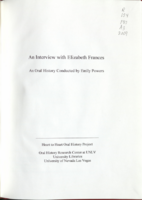
Transcript of interview with Elizabeth Frances by Emily Powers, July 22, 2008
Date
2008-07-21
Archival Collection
Description
Elizabeth Frances, born in Laramie, Wyoming in 1931, was the fourth of nine children. Her father was a plasterer until WWII, when he went to work in the shipyards in Washington State. The family then moved to Salem, Oregon, and Elizabeth attended high school there through her junior year. She actually finished high school in Saratoga, Wyoming, becoming the first of her siblings to graduate. Elizabeth married the same year she graduated (1949) and followed her husband's quest for work to Oregon and California. It was in Santa Rosa that she entered into university course work for her LPN degree. Once they moved to Las Vegas, she entered the LPN program at Southern Nevada Memorial Hospital (now UMC) and graduated in 1965. During her five years in the ER at Memorial Hospital, Elizabeth entered the two year RN program at UNLV, graduating in 1971. She left the hospital to work for Dr. Fink for two years. She shares descriptions, explanations, and anecdotes about her time there, including much of the on-the-job training she received from the doctor. In 1973, Elizabeth was offered the opportunity to teach at the LPN school she had started with, and she also went back to UNLV for her baccalaureate degree (1977). She worked for Workmen's Compensation for four years and details the team components, job requirements, and the new-found respect that the teams garnered from doctors. Elizabeth was called to Sunrise Hospital in 1978 to fill a new position under the education department and worked there for 18 years. Though she has seen many innovations in medicine due to advancing technology, Elizabeth believes that basic nursing skills involving observation and knowledge of the patient are still of primary importance. After retirement, Elizabeth began working full time for the museum in Lorenzi Park. She worked in all areas and was docent for many years. She and other docents created their own program and study, travel, and read to further their art education. Elizabeth paints in oils and watercolors, has held exhibitions, and recently built an art gallery in her own home.
Text
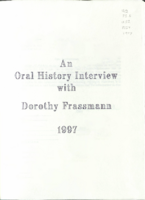
Transcript of interview with Dorothy Frassmann by Dennis McBride, September 21, 1997
Date
1998-05-14
Archival Collection
Description
Born in Brooklyn, New York on October 29, 1931, Dorothy Frassmann talks about her life and experiences.
Text
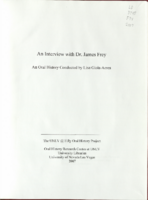
Transcript of interview with Dr. James Frey by Lisa Gioia-Acres, February 14, 2007
Date
2007-02-14
Archival Collection
Description
James Frey was born in Eureka, South Dakota, in 1941. His father worked in creamery and his mother was a registered nurse. When James was nine, the family,including his twin sister, relocated in Sioux Falls where his dad was plant manager for a dairy. He joined the YMCA in the fourth grade and ended up working for them until James attended Augustana College in Sioux Falls, graduating with a major in sociology and a minor in history. After graduation, he worked for three years at the YMCA in Sioux Falls as program director. He earned his master's degree in sociology at the University of Iowa in two years, and was hired at the YMCA in Whittier, California, where he worked for three years. While working in Whittier, James was offered a fellowship to Washington State University in Pullman. He committed to completing his doctorate in three years, and while still working on his dissertation began sending out applications. He sent one to UNLV and arrived in Las Vegas for an interview in 1974. James was hired as assistant professor of sociology at UNLV, and immediately established a survey center at the university. He also converted his dissertation into a book length manuscript and had it published, followed by other books and articles over the years. He conducted a survey on a very high-profile political race between Sheriff Ralph Lamb and his opponent, John McCarthy, which led to work for the State of Nevada, Yucca Mountain, and other entities. The survey program was eventually named the Cannon Center for Survey Research, after Senator Howard Cannon. In the course of his career, James was tenured, taught in London under a university sponsored program, spent a sabbatical in Washington, D.C., doing research, taught several classes, and served seven years as dean. He has detailed memories of the contributions of several university presidents, including Brock Dixon, Pat Goodall, Robert Maxson, Kenny Guinn, and Carol Harter. Today, Dr. James Frey and his wife of over thirty years, Carol, are both retired. He has made a smooth transition to president of his Rotary Club, Chairman of the Nevada Humanities group, and spectator at UNLV basketball and football games. He and his wife plan to stay in Las Vegas, close to their son and friends and neighbors they know and love.
Text
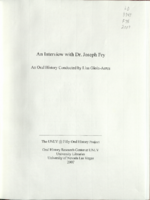
Transcript of interview with Dr. Joseph Fry by Lisa Gioia-Acres, October 09, 2007
Date
2007-10-09
Archival Collection
Description
Dr. Joseph "Andy" Fry is currently a professor of history at UNLV. He was born and grew up in West Virginia, the only child of an insurance salesman and a public school teacher. His parents met in Ronceverte, West Virginia, and lived for a while in his grandmother's boarding house. He had an idyllic childhood in this small town of 2500 people. Andy received an excellent high school education, including learning eighth grade English and 2 years of Latin from his mother. After graduation, he was interested in playing college basketball and ended up at Davis and Elkins College in east central West Virginia. Undecided on a major at first, he tried math and then chemistry, but he found his niche when he began studying the history of western civilization. During his undergraduate years, Andy met his wife-to-be, Sandra Schwitzer, and they were married in 1969 in the summer after their senior year. He was accepted at graduate school in history at the University of Virginia, so he and his bride moved to Charlottesville. After that, he worked for 2 years at Virginia Tech. In 1975, Dr. Fry was offered a job at UNLV, so he and his family packed up and moved to Las Vegas. He was welcomed to the history department by such notables as Roman "Jay" Zom, Ralph Rosky, and Tom Wright. In addition to teaching, he has had the opportunity to do research, write 4 books, and edit a series of diplomatic biographies. Andy was department chair in the mid 80s and again from 1999 to 2002. He also served for three years as executive assistant to Dr. Carol Harter (president of UNLV for 11 years), but prefers teaching over administrative work. His plans for the future are to finish a fifth book and continue teaching to at least age 66.
Text
Pagination
Refine my results
Content Type
Creator or Contributor
Subject
Archival Collection
Digital Project
Resource Type
Year
Material Type
Place
Language
Records Classification
